Gratitude for Bill Rauch and the Oregon Shakespeare Festival
This week on HowlRound, ten rising leaders from TCG's SPARK Leadership Program examine leadership, vision, diversity, inclusion, and equity, as well exciting trends and trend makers in our field. Find the full series here.
In June of 2008, just days after graduation, I was off to set up my new life in the beautiful Pacific Northwest. I didn’t know it at the time, but I was about to embark on a transformational journey with a leader who would become a cherished mentor; a brilliant man of the theatre who would teach me many lessons. I still remember receiving that initial email from Bill Rauch, wondering if I would be interested in joining him and his new artistic team in Ashland for what would be an exciting time at the Oregon Shakespeare Festival. I was completely floored. He said, “I hope we’ll rock the American theatre and I’d love for you to be a part of it.” It was an opportunity too good to pass up. So off I went, entering the crucible of the unknown as I welcomed this new chapter with equal parts wonder and intimidation.
When I first interviewed for the associate producer position with Bill in Los Angeles, he and I bonded over the larger purposes of what storytelling could do. We both understood how theatre could be a catalyzing force to make a difference in the world. I also shared my belief that theatre could be a radical act of social engagement and bridge-building. With my own deep ties to a company birthed in a call for social justice (El Teatro Campesino) similar to the company he co-founded (Cornerstone Theater), I felt an instant connection to Bill.
I’m a firm believer in the best idea in the room wins. [A]s a director and artistic director I am the editor of other people’s good ideas, and my job is to have good taste, and to be curious and interested in listening to everyone around me so I can hone in on the best ideas.
As Bill’s associate producer, I was charged with leading a number of initiatives, including having a major hand in the artistic production of all eleven mainstage shows. It was glorious. But it was daunting too. I didn’t sleep much during the first six months. The first year was a dizzying combination of highs and lows, and, to be honest, I made a lot of mistakes. But Bill was never fazed. I was able to “fail forward” because of his unwavering belief that I belonged at his table.
Bill was passionate about bringing this vision and values to Ashland and the Oregon Shakespeare Festival. We were indeed standing on the shoulders of giants while carving out a fertile new path for the organization. But change is hard and in some ways it was a painful time, too. We spent hours as an artistic staff working to articulate how Bill’s values could guide our efforts and inspire us all. It wasn’t long before the values of company, and its new ethos of inclusion and generosity, began to play an important role in my life as an artistic leader.
For a long time I thought to myself, “Why me?” Why had Bill taken a chance on me? My hope is that maybe he saw something in me I’m only now beginning to fully discover. Remember that crucible I mentioned? I came out renewed and I carry Bill’s influence and mentorship with me every day.
It’s been almost four years since I packed up my bags in Ashland and headed east for the Windy City. I remember my final stop was at a gas station right off Interstate 5. I filled up the tank of my Jeep Liberty and made one final post on Facebook as an Oregon resident. It said, cliché as it was: “It’s not goodbye but see you later OSF.” And, with the Siskiyou Mountains in the distance, off I went. But Bill Rauch and the Oregon Shakespeare Festival have never left me. Now, in a week dedicated to leadership on HowlRound, I want to express my gratitude for this chapter of my life and career.
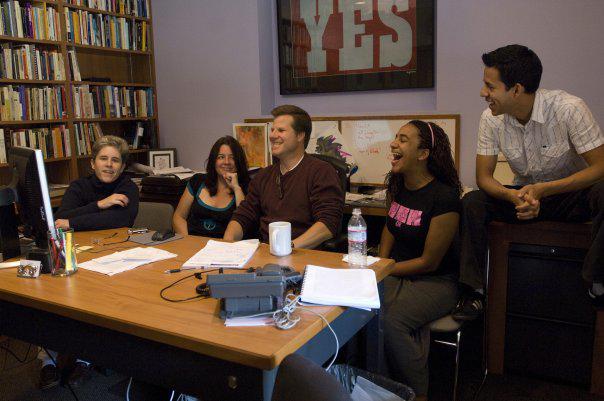
At my current artistic home of The Public Theater, I still carry with me all the lessons, challenges, stories, and joys, encapsulated in the truly vivifying experience of my time with Bill Rauch and the Oregon Shakespeare Festival. I was able to speak with Bill on the phone recently and we reflected together about his time so far at OSF. We spoke about his vision, the mentors in his life, and how individual values guide the work we put on stage. Here’s an excerpt of our conversation:
Jacob Padrón: Do you think your vision for what theatre can do in the world changes as you grow and evolve as a leader and artist?
Bill Rauch: I think my great love and faith in the theatre’s ability to build community and to transform individual human hearts has been a constant in my life and has been unwavering. But the different ways to achieve community transformation, and different ways stories can land in audience members’ hearts, the different ways by which you can capture the impact of the work— those have shifted for me a lot over the years. And they shift every day. We closed a play last night, Fingersmith, and I was reminded that my ability to understand what art can do continues to mature and deepen. But I think there’s an absolute through line that remains unchanged.
JP: I imagine that your time with Cornerstone Theatre, the community-based company you co-founded in 1986, largely shaped your love and faith in theatre. How did your vision for Cornerstone, which feels very much rooted in a democratic impulse, influence the transformation that’s happened at OSF?
BR: In many ways, Cornerstone and OSF could not be more different: financially there is a big difference, with Cornerstone being largely driven by contributed income and OSF being largely driven by earned income; Cornerstone was about performing for and with low-income communities, whereas OSF is performing for mainly a tourist audience base; and then, in terms of scale and operation, and the number of people working at both companies is quite different. So there are many dramatic differences, but the things that link both organizations are my values— certainly company, with artists and artisans being at the center of the work. The commitment to classic work and new work being in dialogue is something that both organizations share. Also, the ownership of the art. With Cornerstone we made the art with the community so there was an immediate investment. And with OSF, as you know, the audience has a tremendous sense of ownership of the organization and the work itself. For so many theatres around the country, their identity is largely shaped by the artists they are serving. They’ll say, “we’re an actors’ theatre” or “we’re a directors’ theatre.” At OSF, as our brilliant founder Angus Bowmer once said, “We’re an audiences’ theatre.” Everything we do is in the service of our fiercely loyal audience.
JP: The OSF audience’s deep sense of ownership points to the fact that OSF has always had a strong organizational culture. It’s something to celebrate, but I think it also made change that much harder. We were really in the trenches together during the beginning of your tenure and I’m curious to know what advice you’d give yourself then, knowing what you know now?
BR: I was attracted to the job at Oregon Shakespeare Festival because I loved the legacy and everything the organization had been, and the history of innovation the company was founded on. The way the company continued to redefine and transform itself in stunning ways over the years despite really difficult circumstances was very inspiring. As a founder I was very moved by that, and to be entrusted to build on the history and legacy of another founder’s vision really moved me. With that said, I think I spoke about change as an absolutely uncomplicated good. I don’t think I realized that every time I used the word “change” it could be perceived as a dagger in the hearts of the people who had been with the company for decades. I think I was sloppy in my language in relation to how I talked about change—because in many ways all of the new things I wanted to do were building on all the work and all the innovation that had come before. I had deep respect for what had come before, I just didn’t acknowledge that history well enough. As a result we experienced much more heartache and resistance from within. To be honest, I expected resistance from the audience and for the staff to be on board with the changes, but it was flipped. The audience went on the ride and it was the company that had a harder time.
JP: Something I’ve always admired about you is your commitment to opening doors to emerging artists and being a mentor to so many in the field. Where does that come from, and who are your mentors?
BR: Oh my goodness. I feel I have been mentored by so many people in my life who have been so generous to me. First of all, like many of us who fell in love with theatre at a young age, I had great drama teachers: A woman by the name of Jeanette Koelewyn who was my middle school drama teacher; Jack Shaw who was my high school drama teacher; and most especially, Joann Green Breuer, who ran the experimental theatre at Harvard and was a wonderful acting teacher. So many of my values are reflective of Joann’s values. I could go on for hours reflecting on the influence Joann has had on my life. Jack Shaw came to see my production of All the Way on Broadway, and Joann comes to Ashland almost every year to see the work—so they’re actively in my life. Another mentor that comes to mind immediately is Peter Sellers, an opera and theatre director. I worked as his assistant for a year at the very beginning of my career when he was working at the Kennedy Center. He was incredibly generous. On several occasions he let me rehearse with the actors on my own, which is very rare for an assistant to do. Here at OSF my predecessor, Libby Appel, was extremely good to me and really set me up for success, having me direct in all three theatre spaces and doing both classic and new work. Also, Paul Nicholson, who was the executive director when I took over in 2007. All of these people have just been so extraordinary and extremely generous to me over the years. I could go on and on, but those are the biggies.
JP: You talk about how generous these mentors were, and I think the value of generosity is one of your pillars of your vision for OSF. Connected to that is your deep belief in company and the power of repeated artistic relationships, as well as the importance of making room for everyone to be at the table. Can you talk more about that?
BR: I co-founded Cornerstone with Alison Carey—and boy, when I talk about people I’ve learned from, Alison Carey is a big one. She and I have worked together for 35 years, since my freshman year of college, and she’s someone I just learn from again and again. When Alison and I started the company, most of the founding company members were our college friends, including my husband Christopher Liam Moore, who I’ve been with for 31 years, and there was a lot of built-in history. I think there has been a lot of blurring in my life of working with people I know personally and have history with. The danger in that is theatre can then be perceived as a closed club in terms of who people work with. So I try to strike a balance between the deep joy of working with old friends, with all the shorthand and shared trust and just the love of being with them in a creative process—because what we do is really hard—and pushing myself to work with new collaborators. Libby is a generation older than I am and the directors she was hiring were her age, her peers. In my early years here the directors I was hiring were my age, my peers, and I realized I had to look not just to my own generation but to the masters, the generation older than me, as well as the generation younger than me. So I’m now deliberately trying to find the right mix and strike a balance. On average, first time OSF directors direct five of the eleven shows. That has created a lot more stress in process; it’s much harder on everyone, including those directors. It’s also harder on the staff. But at the same time I think real artistic vibrancy comes from that—from a mixture of old relationships and first time collaborators.
JP: That reminds me of another value I’d love for you to talk about—about how the best idea in the room wins no matter where it comes from. That, too, takes real generosity as a leader.
BR: I’m a firm believer in the best idea in the room wins. I think as a director and artistic director I am the editor of other people’s good ideas, and my job is to have good taste, and to be curious and interested in listening to everyone around me so I can hone in on the best ideas. You know, even if someone doesn’t have a particular expertise in something, if they have a great idea it should win. There’s no two ways about it. And when I think about where that value comes from, it’s certainly from Cornerstone, where we were creating work together and it was about deep listening, always.
JP: I think the idea that everyone can have a voice is something that the field struggles with, and that many leaders struggle with. I wonder, why do you think it’s so difficult, as leaders, to be generous?
BR: I think leadership is lonely and leadership is frightening, and just the nature of the nonprofit structure is hard, so there is going to be a lot of struggle. And I think that does make it difficult for leaders to be open and be generous. But I do think all art is rooted in love and if you’re not leading from a place of love and generosity than you’re not actually modeling in your process, and what we all need to model in the art.
JP: Yes! This makes think about something I cared a lot about during my time at OSF, which was how to make the entire staff feel more deeply connected to the work on stage. Because by doing so, the work could actually be richer. There continues to be such a firewall between the creative engines of our theatres (the artistic office) and the rest of the organization. I wonder if that needs to change. And often times the staff just wants to feel more connected to how decisions get made.
BR: I think that’s true. And because the work in a nonprofit arts organization is so challenging and we’re so often under-resourced relative to the vision of what we’re trying to do, it makes sense that people get confused about how decisions get made. We try so hard to be transparent in our community and yet the company feels out of the loop or mystified by how the decisions are getting made. One small thing that has been really profound, that Cynthia Rider (executive director of OSF) and I have been doing, is sending weekly updates to the entire company—some weeks there are big things, some weeks there are small things. But this has made a huge positive impact on our culture.
JP: At OSF there is a big commitment to diversity and inclusion and I wonder what your thoughts are about the misconception in the field that there are not qualified leaders of color ready to take on executive leadership positions.
BR: That misconception is false and it needs to change soon. Period.
JP: One final question. What are you most proud of right now as an artistic leader?
BR: I think it’s a really exciting moment for the American theatre. With Hamilton opening on Broadway and Fun Home winning the Tony, both of those items make me really happy in terms of future directions of the field. I’m proud of the success of American Revolutions here at OSF, in regard to looking at moments of change, and that six of the plays we’ve produced so far in the cycle have gone on to be produced by major arts organizations throughout the country. And the fact that there is a hunger to look at who we are as a nation and where we came from and where we might head also makes me so proud.

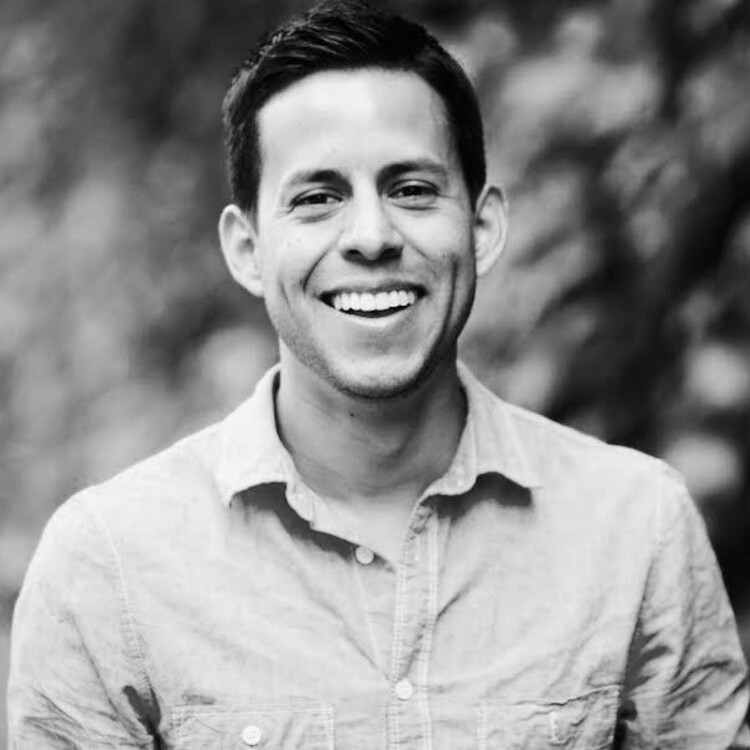
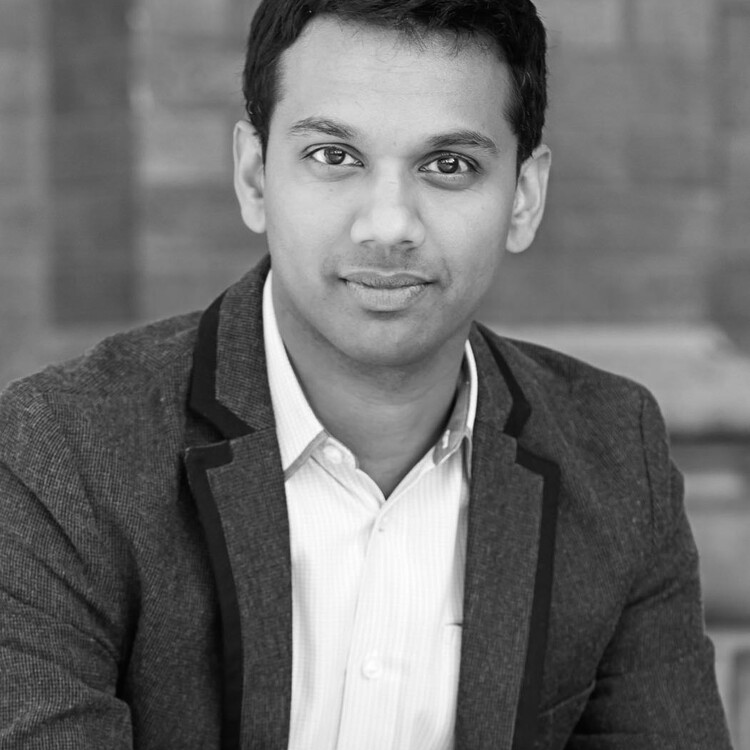
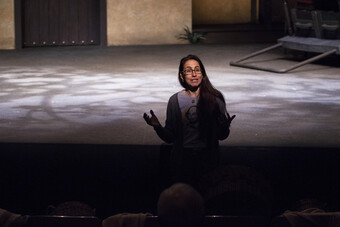


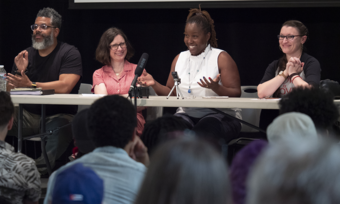


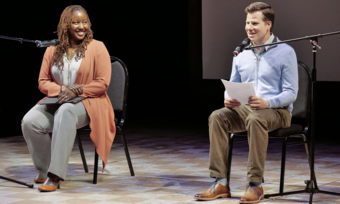
Comments
The article is just the start of the conversation—we want to know what you think about this subject, too! HowlRound is a space for knowledge-sharing, and we welcome spirited, thoughtful, and on-topic dialogue. Find our full comments policy here
I remember Bill when he started Cornerstone. He was just the same in 1986, he was thoughtful, kind and generous with everyone. What a treat to hear that he has not changed in his core values.
Patty Parks
Bill is one of the giants of contemporary American theatre. I'm hoping this conversation is just one of many more to come that analyze and celebrate his ethos, his humility, talent and vision. Thanks, Jacob and HowlRound.
as one of the many Bill has mentored and been generous with, i am happy to see his thoughts here in conversation with you, Jacob. Thanks, HR, for the interview amidst this strong series on leadership.